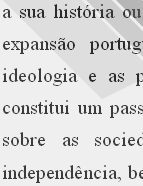

................................
This situation, which cannot be concealed, highlights the need to geographically and culturally autonomise studies on colonial domination to understand the structuring lines of colonialism, its forms of action and the consolidation of the theoretical and methodological hierarchies which characterised the fabrication of Portuguese overseas historiography.
While the last decades of the 19th century were marked by innovations in the writing of the history of Portugal, mirroring the interference of the main European lines of thought in the readings of historians such as Alexandre Herculano, Teófilo Braga, and Oliveira Martins, it was in the 20th century that the historiography of the Portuguese discoveries and expansion took root, by means of research and the publication of texts aimed at glorifying the colonial project.
Jaime Cortesão, whose republican ideals would cost him his exile, dealt with the chapter on Portuguese expansion in Damião Peres' História de Portugal (1928-1954) [History of Portugal(1928-1954)], including the integration of mestizos in the colonial administration structures as one the causes of the decadence of the Empire of the East. The História da Expansão Portuguesa no Mundo [History of Portuguese Expansion in the World] (1937), directed by António Baião, Hernâni Cidade and Manuel Múrias, was also written by Duarte Leite and Veiga Simão. It was only after the Second World War that the divisions became more pronounced, with the adherence of intellectuals and historians to an official discourse, re-elaborated within the framework of the Lusotropical theories which were beginning to arouse national political interest.
Rare historians, such as António Sérgio and Vitorino Magalhães Godinho, aspired to understanding the national and imperial past in the light of a universal and comparative history capable of questioning the rhetoric of the glorification of the conquests (Curto, "A memória dos descobrimentos, da expansão e do empério colonial" ["The memory of the discoveries, expansion and colonial empire"], 2009). "For decades (...) authentic overseas history was developed mainly on the fringes of official institutions and achievements, and was even restricted by them", as "the myth of a people (...) that had never been tainted by greed and cruelty prevailed; awkward documents were kept hidden ...." and "the Exposição do Mundo Português [Exhibition of the Portuguese World] was organised in 1940 and the Comemorações Henriquinas [Prince Henry the Navigator Commemorations] in 1960 [that] did little to enhance the progress of historical research and the innovative visions of these processes that were so crucial to the formation of the world (...).
